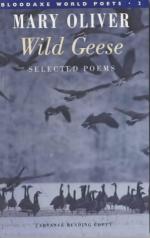|
This section contains 539 words (approx. 2 pages at 400 words per page) |

|
Nature and Humankind
The reader does not have to know that Mary Oliver is a nature poet to know that "Wild Geese" is a nature poem. That fact resonates throughout the work, as it compares nature's condition to the human condition. As with most poems that make this comparison, nature comes out on top. One should not dismiss the work as another tirade on how bad people are and how good animals, plants, mountains, and so forth are. The person addressed here is lonely but not necessarily bad. Although the speaker declares up front that "You do not have to be good," there is no indication that "you" are anything other than despairing and lonely. That description, of course, evokes more pity for the human condition than anger or animosity.
"Wild Geese" is also different from many other natural world vs. human world poems in its portrayal of nature's...
|
This section contains 539 words (approx. 2 pages at 400 words per page) |

|




